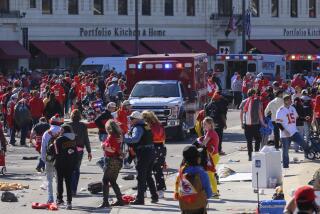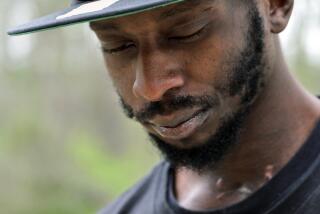Guards defied orders, U.S. says
WASHINGTON — The five Blackwater security guards indicted in the deaths of unarmed civilians in Baghdad last year were operating in the area in defiance of U.S. government orders and opened fire with automatic weapons and rocket-propelled grenade launchers, killing some people as they tried to surrender or flee, according to a Justice Department investigation made public Monday.
The government’s case against the five men was laid out in court documents unsealed by a federal judge. A sixth Blackwater guard, Jeremy P. Ridgeway, has provided information to authorities about the Sept. 16, 2007, shootings at crowded Nisoor Square.
At least 17 Iraqis were killed and 20 others injured in the incident, which severely damaged relations between the U.S. and Iraq and led to calls for more scrutiny of Blackwater Worldwide and other contractors providing security in the destabilized country.
Federal authorities said Ridgeway had cooperated with prosecutors and the FBI -- which conducted one of the most complicated overseas investigations in its history -- as part of his agreement to plead guilty to lesser charges. Assistant Atty. Gen. Patrick Rowan would not comment at a news conference Monday on whether Ridgeway would testify against his former Blackwater colleagues.
The other guards have said they were defending themselves after being fired upon by suspected insurgents. But Ridgeway, who as the turret gunner in the last vehicle had a panoramic view, has provided information that strongly indicates the shootings were unprovoked, authorities said.
The members of Blackwater’s Raven 23 convoy were not authorized to leave the fortified Green Zone on the day of the shootings, and “they also understood that they were only authorized to discharge their firearms in self-defense and as a last resort,” according to a statement signed by Ridgeway and prosecutors.
But they did so anyway in response to reports that an improvised explosive device had exploded near a Blackwater security detail about a mile from Nisoor Square, Ridgeway said in his statement. The team also refused a subsequent U.S. government order to leave the civilian areas of Baghdad and return to the safety of the Green Zone “as soon as possible,” Ridgeway said.
“In contravention of that order, the Raven 23 convoy, under the command of its shift leader, proceeded to set up a blockade at Nisoor Square to stop civilian traffic from flowing through the traffic circle,” he said.
Such acts of defiance set the stage for the deadly incident, which was compounded because the Blackwater guards made “no attempt to provide reasonable warnings” to the driver of a white Kia sedan who unwittingly approached the blockade only seconds after it was set up and failed to come to a complete stop, according to Ridgeway, court documents and statements by senior Justice Department officials.
Ridgeway said he and other members of the Blackwater team pumped hundreds of machine-gun rounds into the Kia, killing its occupants, a second-year medical student named Ahmed Haithem Ahmed Al Rubia’y and his mother, a doctor, who was sitting in the passenger seat.
Minutes later, Ridgeway said, the Blackwater convoy departed Nisoor Square against the flow of traffic, and turret gunners in the convoy “continued to fire their machine guns at civilian vehicles that posed no threat to the convoy.”
“That day in Baghdad, around the busy traffic circle at Nisoor Square, Iraqi citizens were going to lunch, stopping at the market, traveling with their families and children,” said Joseph Persichini Jr., assistant director in charge of the FBI’s Washington Field Office, which led the investigation. He called the subsequent shootings “shocking and a violation of basic human rights.”
FBI agents, prosecutors and forensic specialists made at least four trips to Baghdad to gather evidence, he said.
One victim was shot in the chest while standing in the street with his hands up, and the Blackwater guards used a rocket-propelled launcher to fire grenades into a girls’ school, causing even more injuries, said Jeffrey Taylor, the U.S. attorney for Washington.
“None of the victims of this shooting was armed,” Taylor said. “None was an insurgent.”
The five defendants surrendered to authorities in Utah on Monday. Sources close to the men said they did so in an effort to get the case tried there rather than in Washington, where they were indicted after a lengthy grand jury investigation. But a judge in Utah ordered them to report to a Washington courthouse Jan. 6, where they were expected to plead not guilty.
Each of the five men was charged with 14 counts of voluntary manslaughter and 20 counts of attempt to commit manslaughter. Unlike Ridgeway, they were also charged with using a machine gun to commit a crime of violence, a charge that carries a 30-year minimum sentence. They were not charged in three of the deaths.
The indictment, which was returned under seal Thursday, identified the defendants as Paul A. Slough, 29, of Keller, Texas; Nicholas A. Slatten, 24, of Sparta, Tenn.; Evan S. Liberty, 26, of Rochester, N.H.; Dustin L. Heard, 27, of Maryville, Tenn.; and Donald W. Ball, 26, of West Valley City, Utah.
Ridgeway agreed to plead guilty to one count each of voluntary manslaughter and attempted manslaughter, and faces at least 17 years in prison. He was arrested Friday in Washington, which the Justice Department said allowed its prosecutors to bring all of the men to trial in the nation’s capital in the coming months. No trial date has been set.
Even before the indictments were unsealed, defense lawyers accused the government of pursuing a politically motivated case. And they said it would be all but impossible for prosecutors to convict the men of manslaughter, given the dangerous atmosphere in that part of Baghdad at the time.
They also said the State Department initially granted immunity to the men in exchange for their cooperation, tainting any evidence gained as a result. And they are contesting whether the Justice Department has the jurisdiction to bring the charges under the Military Extraterritorial Jurisdiction Act, which largely applies to American armed forces operating outside the U.S.
Carl Tobias, a professor at the University of Richmond School of Law, said it would be difficult for the government to win the case because of jurisdictional questions and the immunity issue.
“Some of these problems result from the U.S. government’s failure to create a clear, workable framework for private security contractors, so they operated in a legal vacuum,” Tobias said.
--
More to Read
Sign up for Essential California
The most important California stories and recommendations in your inbox every morning.
You may occasionally receive promotional content from the Los Angeles Times.









